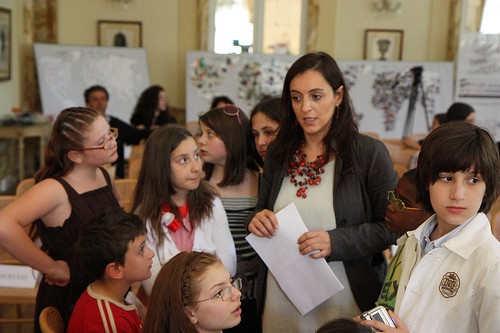
Language learning and Asperger’s syndrome
by SeanSPaul
Teaching children with Aspergers syndrome requires a thorough understanding of the disorder. With enough planning and support any child can thrive in a language learning classroom.
Asperger’s syndrome is an autistic spectrum disorder (ASD). Many children with Asperger’s syndrome have difficulties communicating, which means learning a second language can be problematic. With the right support, however, most children with autistic disorders can thrive in a language learning environment.
Compared with their adult counterparts, children have an extraordinary ability to learn new languages. Even so, teaching children a second language can be challenging. The key to effective teaching is in tailoring the programme to the needs of the children. Understanding the common characteristics of Asperger’s syndrome helps language teachers to plan lessons that are accessible to children with autistic spectrum disorders.
The learning environment
Some children with Asperger’s syndrome are hypersensitive to sensory input. This means that factors including bright lighting, sudden noises and room temperature can affect them more than most students. If they are distressed or distracted, they will not achieve their full potential. Speak with each student, as well as parents or care-givers, to make the classroom less of a barrier to learning.
Form a routine
Many children with an ASD prefer to learn with the consistency of a routine. Providing the student with detailed lesson plans can be helpful, but in practice the class may not follow the plan exactly. Build a routine by beginning each lesson with a specific task and ending with a summary or quiz.
If a different teacher is needed to cover a lesson, make sure you leave detailed instructions so the routine is maintained. This will ease the transition for the student, who may otherwise struggle.
Use concrete examples
When teaching a second language, introduce new words and phrases with concrete examples. Children with Asperger’s syndrome may struggle with abstract language. Use visual cues alongside new vocabulary, matching words with pictures.
Some students will have a natural aptitude for grammar. While they might understand formal grammatical rules, they are also likely to be inflexible when speaking. Overly formal speech is common in children with Asperger’s syndrome, so idioms and informal language can be difficult to teach.
Involve interests
Asperger’s syndrome is associated with specialised interests and obsessions. If your student has a specific interest, use this to your advantage in the classroom. Pockets of knowledge are starting points for learning and practising new vocabulary. Incorporate the student’s interests to make the lessons engaging.
To make the language relevant, balance it with facts about the associated country and culture. A holistic approach to language works best, as witnessed in the growing number of IB schools London offers for students with Asperger’s syndrome. Linking language to other classes will provide a well-rounded education for students who may otherwise shy away from specific subjects.
Non-verbal communication
Many children with Asperger’s syndrome have difficulty interpreting facial expressions or body language. Subtle cues that most people take for granted are barriers to many students. Work with your student to devise some simple hand gestures for the classroom. These gestures can be used to mean that it is time to move on to the next topic, or that it is someone’s turn to speak.
Inclusion is a hot topic in education. Each child has different needs and will be affected by different levels of severity. With numerous Aspergers schools London is well equipped to cater for children with ASDs. No matter what the environment, breaking the barriers to language learning begins with the co-operation of the student, the care-givers and the school. Once an effective plan is in place, there is no reason why children with Asperger’s syndrome are not able to access a second language.
What is the main challenge for a student with Asperger’s when learning an additional language?
Resource box
BBC Health
This BBC article offers information and advice relating to Asperger’s syndrome
Languages without limits
Common barriers to learning modern languages and strategies for students with Asperger’s
Aspen
Aspen is the Asperger Syndrome Education Network
You might also like
British English Phrases, Idioms, and Expressions (Letters A-C)By Mira at Wizzley. Some of my favorite words and phrases that are particular...
English Words with Odd SpellingsEnglish is full of words whose spelling make no sense compared to the way the...






 Book your bed and breakfast in Manchester nowon 11/08/2012
Book your bed and breakfast in Manchester nowon 11/08/2012
 6 of the most beautiful villages near Londonon 09/24/2012
6 of the most beautiful villages near Londonon 09/24/2012
 In today’s marketplace should you buy or rent a house?on 08/29/2012
In today’s marketplace should you buy or rent a house?on 08/29/2012


Comments
My son has ADHD with symptoms of Aspergers. Doing homework with him is quite an adventure. Very informative article and useful.